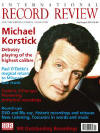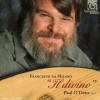Texte paru dans: / Appeared in:
*

International Record Review - (07-08//2013)
Pour
s'abonner / Subscription information
Harmonia Mundi
HMU907557

According to Paul O’Dette, ‘there is no greater pleasure than to play the music of Francesco da Milano’. That he thinks so is no surprise, for O’Dette, perhaps unusually among most modern lutenists of his calibre, greatly prefers the sixteenth-century lute repertory to the early and high Baroque periods and Francesco was the best of the early sixteenth-century lute composers, nicknamed ‘Il divino’ by his admiring contemporaries for his technical skill and above all, unrivalled expressive power as a performer.
O’Dette quotes a description published in 1555 of Francesco perching on the edge of a table cleared after dinner and playing with such ravishing skill that his audience seemed paralysed, deprived of all emotional control and all senses save hearing. On his new disc, O ‘Dette falls far short of Francesco in this respect: unlike Francesco’s listeners, I did not find myself transported by the expressive power of his playing, weeping one moment and raging or laughing the next; but the fault is surely with me rather than O ‘Dette, whose performances are superb. There is a modern temptation to dismiss as poetic hyperbole the various descriptions of lutenists especially, as well as other musicians, from the sixteenth to eighteenth centuries robbing their hearers of their senses and profoundly affecting them emotionally. However, pre-modern listeners, especially in Francesco’s time, undoubtedly had vastly different listening habits from ours, not least because they did not have the power to relive or even pause a musical performance at the push of a button, so that something approximating the described reactions could well have been a not unusual occurrence.
This is O’Dette’s second disc devoted to Francesco da Milano. Almost 30 years ago, he recorded a marvellous programme of 27 favourite pieces, using a year-old Paul Thomson copy of a six-course lute from about 1550 by Magno Tieffenbrucker. His new disc’s programme of 36 pieces includes ah but four of those on the first thisc and he also plays the same lute, now truly tried and tested. This time, rather than a Medieval church, the recording was made in a hall in the USA (Sauder Hall, Goshen College, Indiana); but this venue is even more ‘churchy’ and (the disc’s only drawback, albeit a minor one) the excessively reverberant acoustic slightly distorts the lute’s sound, making it seem appreciably louder and bigger than in real life.
As before, O ‘Dette has organized Francesco’s unfailingly sophisticated and refined pieces into several mini-suites, usually opening with a fantasia or ricercar or two, which display the composer’ s sublime mingling of effortless counterpoint and an almost chanson-like tunefulness and his masterful command of ideas, and closing with a skilful intabulation of a vocal work, including Jean de Richafort’s chanson De mon triste desplaisir and Antonio de Ribera’s motet O bone Jesu, two high points in a generally stratospheric recital.
Interestingly, this time around, O ‘Dette plays most of the pieces in common with the first disc a little slower, so that, while his quicksilver agility in the many virtuoso passages remains, his interpretations have gained greater expressive flexibility and nuance and ‘thus emotional impact. This is most readily apparent in the intabulations of the tender O bone Jesu and the disc’s concluding work, the often-recorded Fantasia (or Ricercar) ‘La compagna’, both of which sound mature and yet at the same time especially fresh and lucid in the same way as Bach or Mozart. Among many other striking examples are O’Dette’s balanced yet searching accounts of the relatively lengthy Fantasia 66 and brief, somewhat melancholy Ricercar 13 (using the numbering of Arthur Ness ‘s complete edition).
Although I did not find myself, like Francesco’s
contemporaries, sprawling in careless deportment with gaping mouth and
half-closed eyes, this magical disc has compelled my full attention for a
good two weeks so far.
Cliquez l'un ou l'autre
bouton pour découvrir bien d'autres critiques de CD
Click either button for many other reviews


